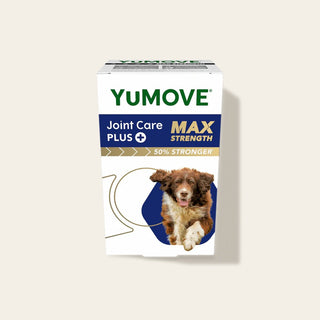

How much do you know about canine joint care?
As every pet owner knows, our canine friends thrive when they’re able to stay active for life.
No surprise there, right? We’ve all seen how excited our dogs can get about exploring their environments, going for a leisurely stroll in a meadow, or playing a high-octane game of fetch. But when push comes to shove, how much do you really know about the ins and outs of canine joint care?
Why not put your knowledge to the test below!
Your dog sleeping more could be a sign of joint stiffness
True. While it’s not uncommon for dogs to love a nap – and while older dogs sleep more – oversleeping can also be a sign that your dog is withdrawing from activity due to stiffness.
If your dog is showing signs of joint stiffness, you should stop taking them for walks so that they’re not uncomfortable
False. It’s very important to keep your dog active throughout their life, as this not only aids their health, but also their mood. Regular physical activity helps maintain joint mobility, prevents muscle wasting and avoids excess weight gain. If your dog’s joints are stiff, talk to your vet about the best exercise routine for them. Your vet may recommend that you take your dog on regular but slower and shorter walks.
Stairs can irritate your dog’s joints
True. While many dogs will have no problem going up and down the stairs, stairs do require a greater range of motion in the joints than walking on a flat surface. For dogs who already have some degree of joint stiffness, this can cause further irritation. Fortunately, there are ramps and even stairlifts available to help your dog go up and down the stairs more comfortably.
Joint supplements are only worthwhile for older dogs
False. While older dogs are typically more likely to experience joint stiffness and can often benefit greatly from some extra support, there are benefits to giving your dog a joint supplement at every stage of their life. YuMOVE Joint Care for Young Dogs, for example, is specially formulated to support the joints of active, young dogs.
Swimming is a great form of exercise for dogs with stiff joints
True. Swimming is a great form of exercise for dogs with joint stiffness, as it’s low impact, develops muscle tone, and takes your dog’s joints through a good range of motion. Of course, it’s important to be safe when taking your dog for a swim, especially if they have stiff joints. Consider a canine lifejacket, and avoid bodies of water with strong currents, harmful algae, or other hazards. Canine hydrotherapy in a pool can be a great option.
Visits to the beach are likely to be tough on your dog’s joints
True. Taking your canine companion to a dog-friendly beach can make for a really fun and joyful day out. But while swimming, fresh sea air, and sunshine can all do wonders for your dog, running in sand, or in and out of the sea, can be tough on their joints. Keep an eye on your dog’s body language during beach visits and only stay for as long as they remain comfortable. When playing in the water, stay knee-deep instead of getting in and out completely, so your dog doesn’t have to struggle against the wet sand repeatedly.
If you suspect your dog has stiff joints, you should start doing joint mobility exercises with them at home immediately
False. While at-home joint mobility exercises can do a lot of good for dogs with stiff joints, it’s very important that you don’t just start doing them yourself without supervision or coaching. Not every exercise is suitable for every dog, or for every situation, and some can be harmful. Consult with a Veterinary Physiotherapist if you notice signs of joint stiffness in your dog, and they can recommend the right mobility exercises to do at home.
The more physical exercise your dog gets, the better it is for their mobility
False. While staying active throughout life is extremely important for dogs, it’s always a matter of striking the right balance. Getting too little exercise can have a negative impact on your dog’s health, bodyweight, and mobility, but over-exercising can also take a serious toll on their joints. Canine athletes and other highly active dogs experience a lot more impact and wear-and-tear on their joints than other dogs, and need extra support to compensate.
Keeping your dog lean can help keep their joints healthy
True. Keeping your dog within the ideal weight range for their breed is one of the best ways of helping to keep them mobile and healthy throughout their lives. Your vet will be able to advise you on the ideal weight range for your dog, and can suggest a diet plan for them if needed. If your dog is above their ideal weight range, their joints are put under more strain as they move around.
Certain breeds are at greater risk of joint stiffness
True. Certain breeds of dogs are especially susceptible to joint stiffness. Large and giant breeds are often predisposed, such as German Shepherd Dogs, Golden Retrievers and Labrador Retrievers. It’s important to consult with your vet to address the particular challenges your dog may face.
How many answers did you know? The more you know about canine joint care, the more you can help your dog lead their best life. At YuMOVE, our mission is to help every pet lead their most active life, for life. If you’ve noticed your dog showing signs of joint stiffness, consider starting them on YuMOVE Dog Joint Care Supplements today.





